Gender-responsive participatory climate adaptation training in Himachal Pradesh, India
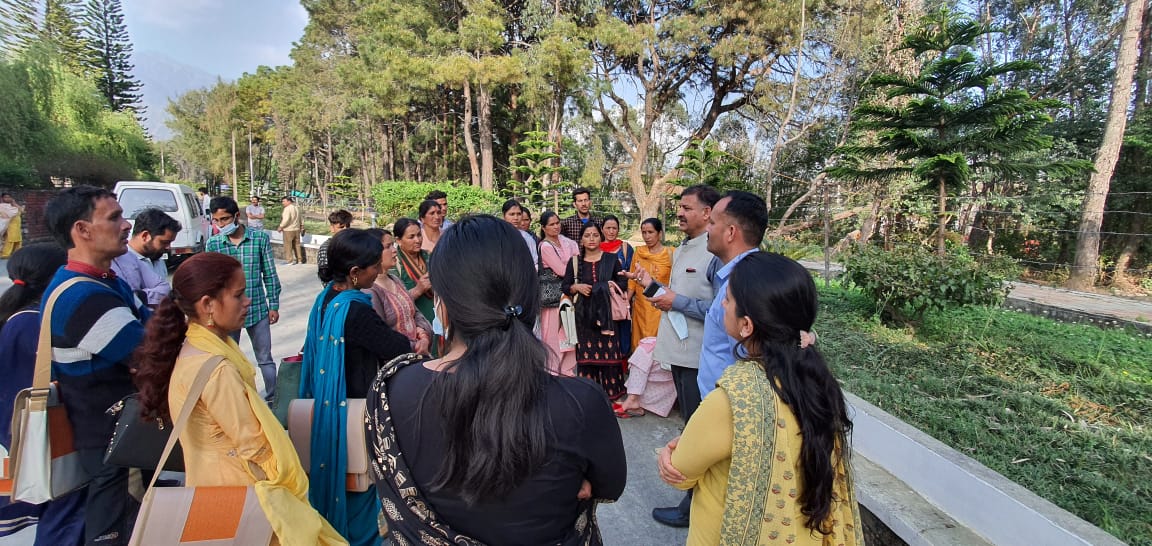
Introduction
Himachal Pradesh lies in the foothills of the Dhauladhar Range of the Himalayas, and the entire state has hilly and rugged terrain. The majority of rural communities do not have proper infrastructure for irrigation or domestic water use and hence rely on natural springs, ponds, and lakes. The state has also witnessed a gradual decline in traditional water systems like traditional wells and recharging structures due to a lack of awareness, leading to overexploitation of groundwater and the loss of cultural value for the local communities.
As indicated in Chapter 2 of the Intergovernmental Panel on Climate Change (IPCC) report, water insecurity is becoming a serious issue in the Indian Himalayan region. Indeed, climate change intensifies water resource issues, leading to more frequent and intense short-term heavy precipitation events, prolonged droughts, melting snow, and reduced glacier volumes. These changes have significant consequences, including reduced agricultural productivity, decreased adaptive capacity for communities, and water quality deterioration.
Women often face unique challenges related to water scarcity, as they are responsible for water collection and management in many households. Moreover, in agricultural communities, women play a crucial role in farming and food production, making them particularly vulnerable to the adverse effects of climate change on agricultural productivity. Therefore, gender-responsive strategies and policies that consider the specific needs and roles of women in climate change adaptation and mitigation are crucial for achieving sustainable and equitable development in the region.
A GoHP and GIZ-led training on crop diversification to enhance the resilience of women farmers
Recognizing the urgency of climate change adaptation and mitigation measures, the Department of Environment, Science, Technology, and Climate Change, Government of Himachal Pradesh (GoHP), has partnered with GIZ as part of the Indo-German Technical Cooperation project “Climate Adaptation and Finance in Rural India (CAFRI)” to build the capacity of vulnerable communities, demonstrate farm-based biotechnology intervention for improved crop-cultivation, and introduce value addition and market linkages for locally-produced farm products.
A sub-project from CAFRI in the Lambathach Gram Panchayat region, in association with the Department of Environment, Science, Technology, and Climate Change, Government of Himachal Pradesh, funded by the Department of Biotechnology, Government of India, aims to improve farmers’ capacity to use and apply biotechnological interventions as essential components of climate-smart solutions. As part of this sub-project, GoHP and GIZ provide tailored training modules that address the specific needs and challenges faced by women in agriculture.
On March 23 and 24, 2022, a two-day intervention training programme on crop diversification (medicinal, aromatic plants, floriculture, apiculture, food processing and dehydration) was held at the Council of Scientific and Industrial Research-Institute of Himalayan Bioresource Technology (CSIR-IHBT), Palampur. The training aimed to enhance the resilience of women farmers by equipping them with the necessary knowledge and skills to diversify their crops and explore alternative income streams beyond traditional agriculture. Specifically, it sought to:
- Empower women farmers to make informed decisions and adapt to the changing climate conditions by expanding their understanding of various crop options and value-added processing techniques;
- Provide health, sustainability, and economic benefits by focusing on medicinal and aromatic plants as well as apiculture (beekeeping); and
- Facilitate market linkages and ensure that the women farmers can access suitable markets for their diverse produce, contributing to their economic empowerment and fostering sustainable local development.
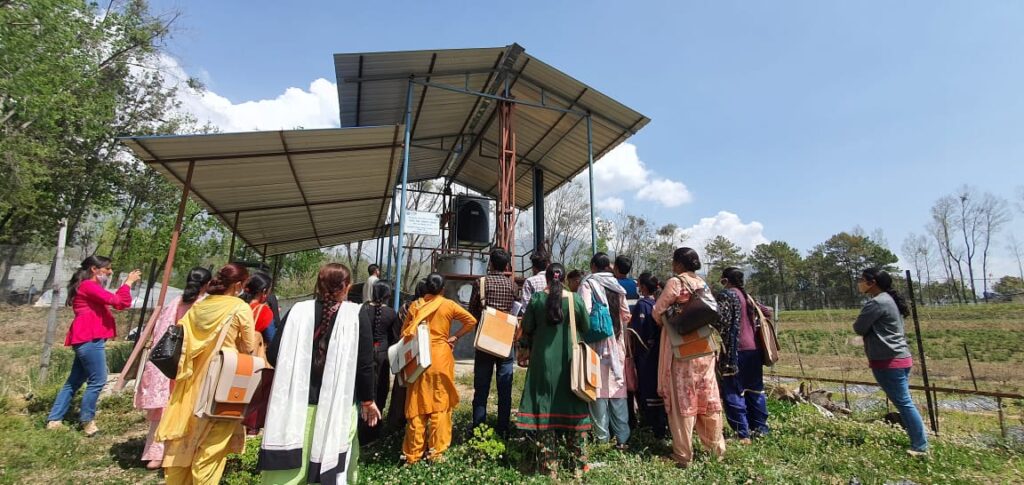
The participants of the training were members of Mahila Mandals (type of women groups), women self-help groups, members of Farmer’s Producer Organization (FPO), Yuvak mandals (Youth Clubs/groups), progressive, representatives of Panchayati Raj Institutions (Village Self-government), Pradhan (president of village self government) of the Lamba Thach Gram Panchayat and marginalised farmers.
Key outcomes
The training emphasized the importance of value addition in agriculture, showcasing various methods to enhance the quality and marketability of crops and products. Participants gained valuable insights into the potential of aromatic and medicinal crops, beekeeping, and dehydrated products, encouraging them to explore these opportunities to improve their agricultural practices and income.
In particular, the participants learned about:
- The importance of preparing nursery beds and plantation at the proper stage to obtain high-quality produce, such as sanitizer from lemon grass and tea of Palma Rosa;
- The different processes for oil extraction from various crops using different methods and machinery;
- The scientific processes being followed in laboratories to convert plant materials into value-added products, like dried flower petals and essential oils, for which there is a substantial global market demand;
- Honey beekeeping and the value addition of bee products. The processes involved in the value addition of bee products, such as honey, bee wax, bee venom, bee pollen, and Royal jelly were explored, with a particular emphasis on bee venom production and its medical uses. Conventional beekeeping using wooden beehives and the importance of following proper procedures throughout the process were highlighted. Participants were encouraged to consider working in clusters for honey production while cultivating horticultural and floricultural crops alongside their existing farming practices;
- The cultivation of Heeng (Asafoetida) in the Himalayas, addressing topics like agro-climatic conditions, soil moisture management, propagation through seeds, and the lifespan of the plant;
- Cultivation of shiitake mushrooms, known for their medicinal value and high vitamin-D2 content;
- The technology for dehydrating food crops and maintaining temperature for high-quality products, as well as the establishment of market linkages with dehydrated crops.
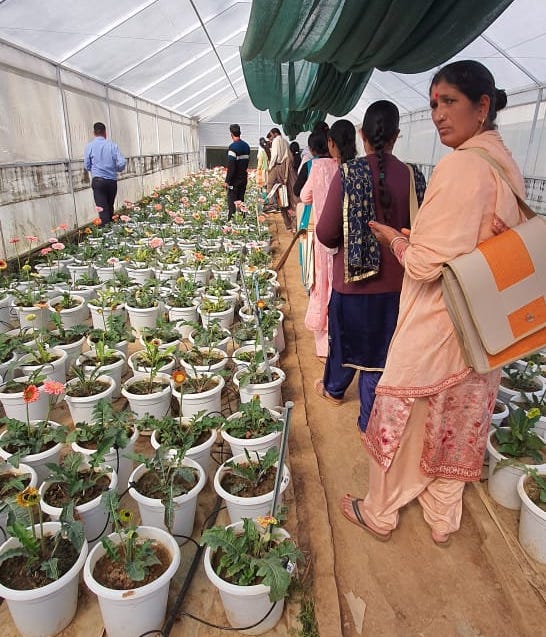
Way forward
Moving forward, based on the insightful interactions and discussions during the workshop, the following priorities will guide our next steps:
- Mushroom Cultivation Cluster Formation: In response to the farmers’ keen interest in mushroom cultivation, we recommend the formation of clusters (groups of farmers) dedicated to mushroom cultivation. In addition, a specialized field-level training sessions, led by scientists, will be organized to assist farmers in establishing their nurseries.
- Organic/Natural Honey Production Clusters: Encouraged by the potential of organic/natural honey production, farmers were keen to form clusters to collectively engage in this endeavor. To support their efforts, the newly developed wooden beekeeping hives tailored to their needs are recommended to be supplied. This should be followed by comprehensive field-level demonstrations to be conducted within their villages to ensure successful implementation.
- Plant Material Processing Pilot: Another important area of interest that emerged based on farmers’ interest, is a pilot project focused on plant material processing. This initiative will encompass crucial aspects such as extraction, drying, and preparation of herbal extracts.
- Cultivation of Heeng & Stevia: The cultivation of Heeng (asafoetida) and Stevia, both suited for healthy production in the region, was a significant topic of discussion. It was decided that interested farmers would receive guidance and support in cultivating these valuable crops.
These collective endeavours aim to empower farmers with practical skills, enhance their understanding of innovative agricultural practices, and ultimately contribute to the sustainable growth of their agricultural pursuits.
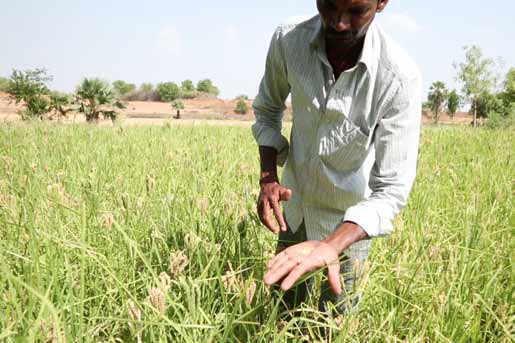
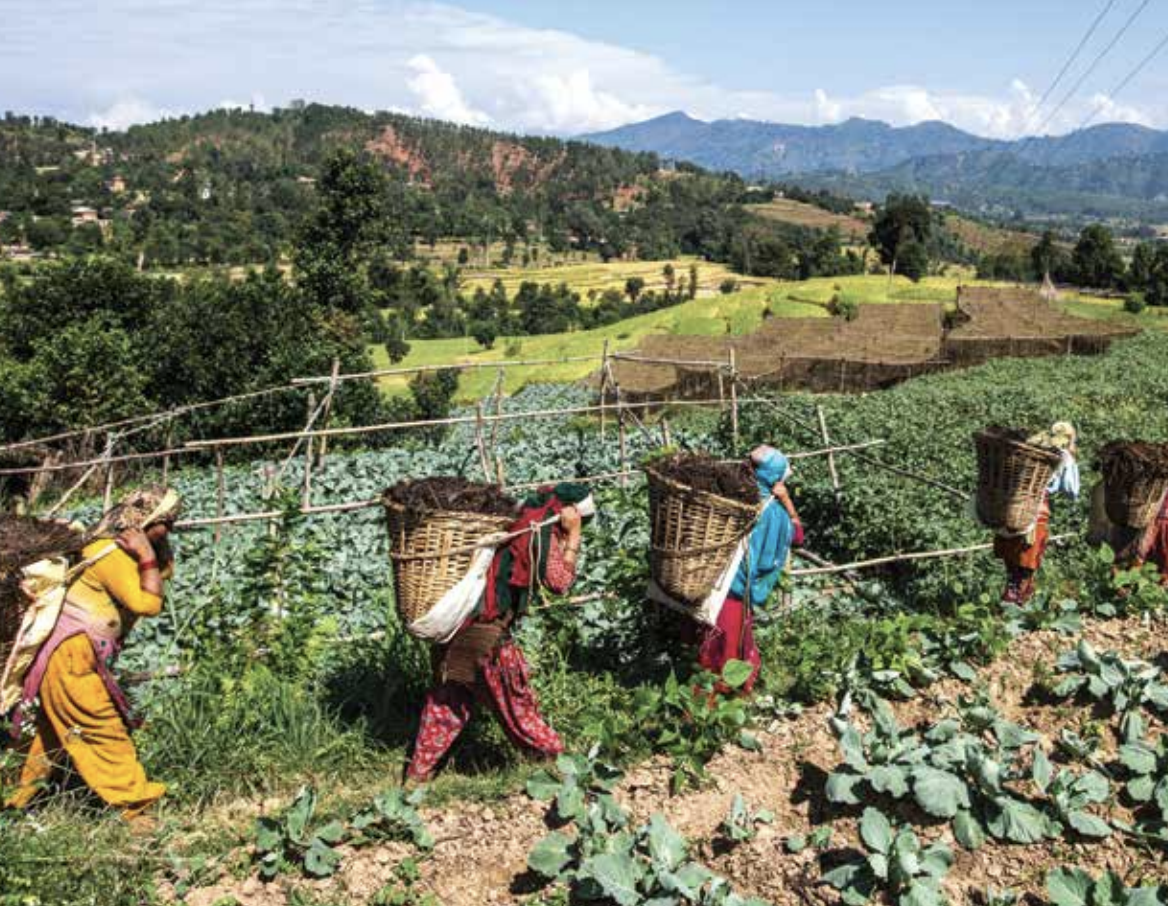

(0) Comments
There is no content